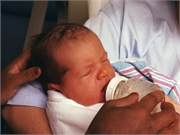Most Newborns of COVID-19-Infected Moms Fare Well

MONDAY, Sept. 28, 2020 (HealthDay News) -- Babies born to mothers with COVID-19 only rarely suffer from effects of the virus, a new study suggests.
These newborns generally do well in the six to eight weeks after birth, but more are admitted to the neonatal intensive care unit (NICU) if their mothers had COVID-19 in the two weeks before delivery.
Of more than 200 babies studied, complications including preterm birth and NICU admission didn't differ among mothers with and without COVID-19. No pneumonia or lower respiratory infections were reported through 8 weeks of age.
"The babies are doing well, and that's wonderful," said lead author Dr. Valerie Flaherman, an associate professor of pediatrics at the University of California, San Francisco (UCSF).
"When coronavirus first hit, there were so many strange and unfortunate issues tied to it, but there was almost no information on how COVID-19 impacts pregnant women and their newborns. We didn't know what to expect for the babies, so this is good news," Flaherman said in a university news release.
Of 263 infants, 44 were admitted to a NICU, but no pneumonia or lower respiratory tract infections were reported. Among 56 infants assessed for upper respiratory infection, this type of infection was reported in two babies born to COVID-19-positive mothers and one born to a COVID-19-negative mother.
According to senior study author Dr. Stephanie Gaw, "Overall, the initial findings regarding infant health are reassuring, but it's important to note that the majority of these births were from third-trimester infections." Gaw is an assistant professor of obstetrics, gynecology and reproductive sciences at UCSF.
Two infants born to mothers who tested positive in the third trimester had birth defects. One had heart, kidney, lung and vertebral abnormalities. The other had facial, genital, kidney, brain and heart issues.
One mother who tested negative delivered an infant with gastrointestinal, kidney and heart issues, the researchers noted.
The findings were published online Sept. 22 in the journal Clinical Infectious Diseases.
More information
To learn more about COVID-19, visit the U.S. Centers for Disease Control and Prevention.

The news stories provided in Health News and our Health-E News Newsletter are a service of the nationally syndicated HealthDay® news and information company. Stories refer to national trends and breaking health news, and are not necessarily indicative of or always supported by our facility and providers. This information is provided for informational and educational purposes only, and is not intended to be a substitute for medical advice, diagnosis, or treatment.

